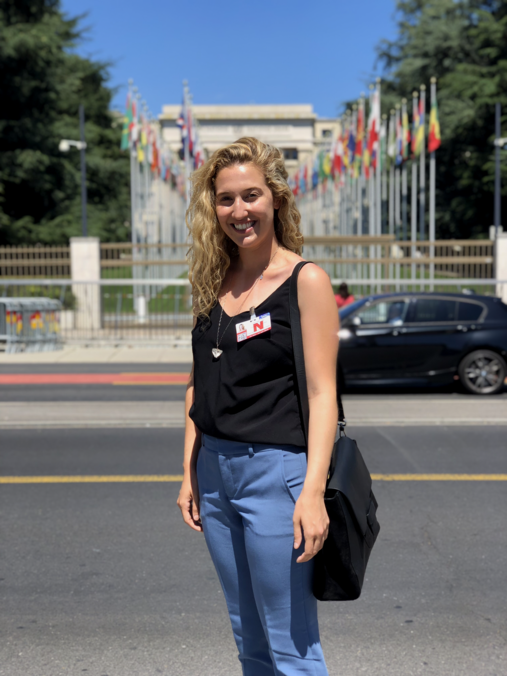Rollin in Research: Week 9
I got to attend the 41st session of the Human Rights Council on behalf of IBJ this week! When the United Nations security officer handed me my temporary badge, I looked and saw a large red “N” across the front. Although I knew it stood for NGO, I couldn’t help but laugh since it doubled as standing for “Not paid.”
I chose to attend a roundtable discussion on access to education for girls in developing countries. Delegates from Rwanda and Trinidad spoke alongside representatives from UNICEF and an NGO working in access to education for girls. I listened to the officials from Rwanda and Trinidad speak on behalf of their respective countries and implemented plans to increase enrollment rates of girls in their school systems. I have heard repeatedly over the years that in order to facilitate girls accessing education, their entire life cycle must be considered. In other words, coded language for handing out tampons and pads, but with no further practical plans being put in place to make it feasible for the girl, a child, to remain in school beyond the most basic years of education. In Trinidad, as the delegate informed us, their action plan included looking not only at the life of a child over years, but also the life of a child throughout one single day. This is why they increased funding for busing. In Rwanda, the government stopped primary school enrollment fees, as they discovered that families were more likely to send their son than daughter when they were only able to afford the fee for one child. Both countries reported significant and steady increases in female student enrollment.
In addition to hearing about progress made in rights access, I also researched and wrote a memo on the progress and implementation of the Central African Republic’s National Recovery and Peacebuilding Plan. IBJ has an active, signed Memorandum of Understanding (“MOU”) with The African, Caribbean and Pacific Group of States (“ACP”). As a courtesy to the Secretary General to the ACP, IBJ agreed to have legal interns assist in research and analysis on various questions the Secretary General and his office had leading up to a planned roundtable. One of those questions being why the National Recovery and Peacebuilding Plan (“RCPCA”), originally enacted in October 2016, remains stagnant both in implementation and funding.
I discovered that there have been multiple concerted efforts to stabilize the county. In fact, the lagging implementation and funding problems with RCPCA seem to be the result of too many humanitarian cooks in the kitchen. The UN Multidimensional Integrated Stabilization Mission in the Central African Republic (“MINUSCA”) was enacted in 2014 and renewed in 2017. However, the UN’s Humanitarian Response Plan for the Central African Republic remains underfunded, with the United Nations Office for the Coordination of Humanitarian Affairs estimating that 52.1% of the plan is not funded.
Given the continued unrest and destabilization, the CAR government released their own response. In October 2016, the CAR government adopted the National Recovery and Peacebuilding Plan for the Central African Republic (“RCPCA”) to address the main structural causes behind continued violence and instability.
Separately, in July 2017, the CAR government, with support from the African Union and the Economic Community of Central African States, launched the African Initiative for the Peace and Reconciliation in the CAR. An obstacle to implementation of RCPCA is the division of efforts, stakeholders, and funding between the two plans.
Further constraints to the implementation of RCPCA stem from chronic underfunding of humanitarian efforts in CAR. The RCPCA focused on early recovery after displacement. Yet, with underfunding in the sectors of shelter, food security, and health, newly displaced populations lack access to vital needs to rebuild on their own and become reliant on aid. Thus, operationalizing key aspects of RCPCA on the ground has become restricted at best, and completely blocked at worst.
A current call to action by humanitarian aid organizations is for the African Initiative and the implementation of RCPCA to work in tandem, which would leverage the political and recovery resources available to the CAR.
For further information, my sources are listed below.
http://documents.worldbank.org/curated/en/774011527677889261/pdf/CAR-RPBA.pdf
https://peacekeeping.un.org/en/mission/minusca
https://www.frontlinedefenders.org/en/location/central-african-republic-car
http://interactive.unocha.org/publication/globalhumanitarianoverview/
Last checked July 8, 2019.
